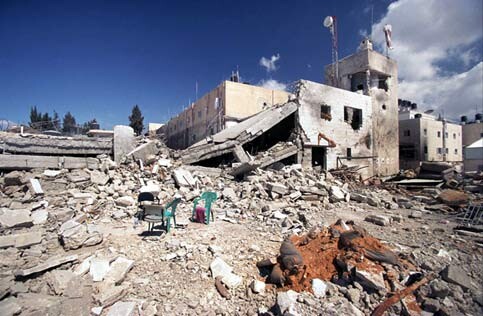World Bank 6 February 2006

PA’s destroyed headquarters in Ramallah following Israel’s April 2002 “Operation Defensive Shield”. The Muqata’ as the compound is known, is the Ramallah district headquarters of several Palestinian Authority offices and security forces. (Ronald de Hommel)
Paul Wolfowitz, president of the World Bank, said yesterday that the Bank should continue delivering aid to the West Bank and Gaza in spite of last week’s electoral victory for Hamas, reports The Financial Times.
Wolfowitz said the Bank was operating in Palestinian areas at the request of the “quartet” of the US, the United Nations, Russia and the European Union. “What we do now depends on what the quartet asks us to do,” he said. “I hope they will ask us to stay.” The Bank chairs the committee of donors for the West Bank and Gaza, which disburses about $1bn a year. The EU, which is the largest single donor, recently suspended some of the aid that was funneled directly into the budget of the Palestinian Authority (PA) in protest at financial mismanagement.
Donors have been warning Hamas since the election that the aid could be withheld or delivered through other routes if the organization did not renounce violence and recognize Israel’s right to exist. Wolfowitz said that keeping aid flowing would help the transition to the creation of a Palestinian state alongside Israel and keep up pressure for Palestinian reform.
The Palestinian Economy and the PA’s Fiscal Situation
The Worldbank estimates that real GDP growth in the West Bank and Gaza reached 8-9 percent in 2005, continuing the modest recovery that began two years ago. Reflecting on the past five years, two distinct periods are discernable: (i) October 2000 through 2002, the period of severe crisis, in which real GDP per capita declined by about 36 percent, and (ii) 2003 through 2005, a period of stabilization and gradual recovery, in which real GDP growth has averaged about 7 percent per annum.
Nevertheless, today’s Palestinian economy still operates at well below its potential, with real GDP per capita almost 30 percent lower than in 1999. The inability of the Palestinian economy to fully use its productive potential is first and foremost the result of restrictions on the movement of people and goods. At the pace of economic growth witnessed since 2003, pre-intifada per capita income levels may not be restored before 2012.
The socio-economic situation is precarious. Unemployment levels remain high. The third quarter (Q3) data for 2005 show unemployment at 23 percent (20 percent in the West Bank and 29 percent in Gaza), i.e. more than double pre-intifada levels. Youth unemployment is more acute, with Q3 unemployment among 20-24 year-olds some 35 percent overall. Around 43 percent of the Palestinian population still fall below the poverty line, with perhaps 15 percent living in deep poverty, i.e., not able to meet subsistence needs.
The PA’s fiscal situation
The PA’s fiscal situation has become increasingly unsustainable mainly as a result of uncontained government consumption, in particular a rapidly increasing public sector wage bill, expanding social transfer schemes and rising “net lending”1. In addition, the depressed economy led to lower tax revenues.

In 2005, the PA’s budget deficit reached about US$800 million, of which c. US$340 million was financed by donors in the form of direct budget support. The remaining deficit was financed through a combination of commercial bank borrowing and liquidation of PA assets in the Palestine Investment Fund. Unless addressed promptly, deficits of this magnitude will compromise the prospects of rapid recovery by destabilizing the PA’s operations and by reducing the public and private resources otherwise available for productive investments.
The Reform Fund
The Public Financial Management Reform Trust Fund (PDF) was approved by the World Bank’s Board of Executive Directors in April 2004. The PA and the World Bank agree every six months on a set of specific reform benchmarks that, upon fulfillment, trigger disbursements. To date, a total of US$310 million has been committed to the Reform Fund from 12 donors, of which US$250 million has been disbursed in four tranches (see table below).
The fifth tranche has no yet been disbursed as the PA has not fulfilled the relevant benchmarks. In particular, the significant increase in public sector salaries and public hiring is a setback with respect to the efforts of placing the PA on an orderly fiscal footing. The PA has not yet committed to any mitigating measures to bring the fiscal situation under control.
Related Links